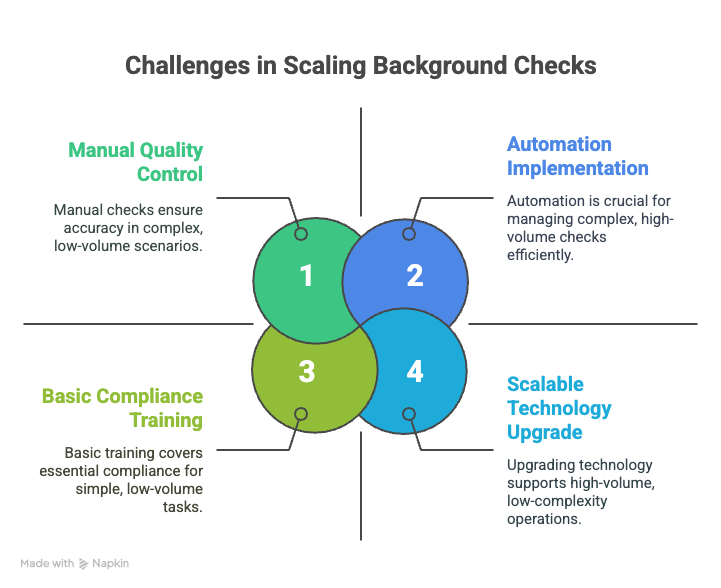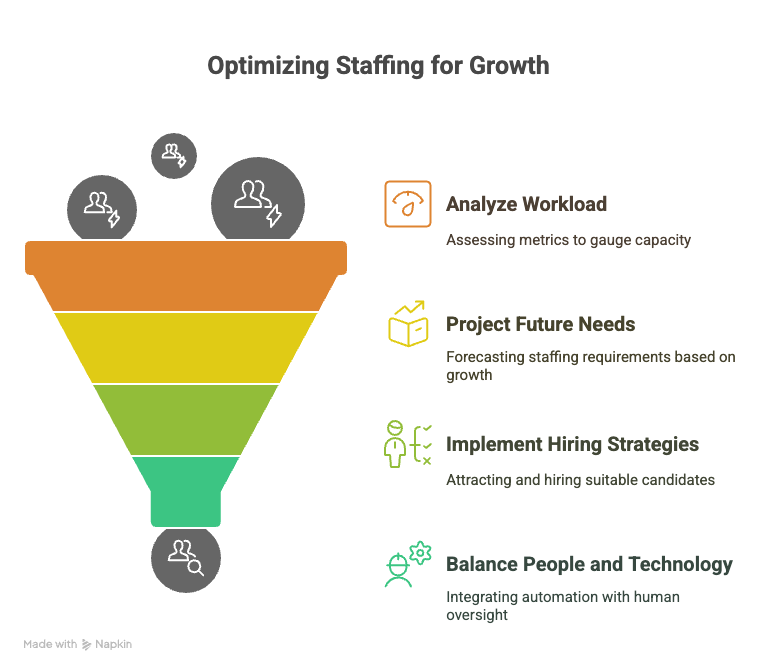In a world where accuracy and speed are vital, scaling background checks efficiently can make or break a staffing agency. As your agency expands, so must your capacity to handle increased volumes of candidate screenings. This guide provides you with comprehensive insights to ramp up your background check operations without losing the personal touch that sets your agency apart.
Key Takeaways
- Streamlining background check operations is crucial for agencies to grow without losing clients or credibility.
- Automation tools can help manage increased demands but require careful selection and integration to work efficiently with existing systems.
- Ensuring compliance with laws like the Fair Credit Reporting Act is essential to avoid legal issues and maintain customer trust.
- Training staff regularly on legal standards and process changes is important for consistent quality and compliance.
- Balancing automation and human oversight allows for efficient operations while preserving decision-making accuracy and service quality.
Introduction
In the staffing world, growth is exhilarating, but it comes with its pressures. As your agency expands, so does the need for efficient background check processes. Skipping a beat in this area can mean losing clients and credibility. This guide focuses on helping you scale background check operations as your agency grows, without sacrificing quality or personalization.
This guide covers key strategies like screening automation, ensuring compliance at scale, and optimizing workflows. These are essential to navigate the challenges of increasing volume while maintaining accuracy and legality. Dive in to discover practical steps to streamline your screening operations and thrive in a competitive marketplace.
EXPERT INSIGHT: Staffing growth goes beyond putting more candidates out there; it means ensuring the integrity of every placement as volume expands. I've seen how quickly everything falls between the cracks when background check processes are not structured for scaling. As much as you automate some parts of the process, it is not a cure-all; it needs people dedicated to spotting what the algorithms might miss. When reputation is on the line with each hire, efficiency is essential, but faith is even more so. Scaling screening operations then becomes not so much a logistic imperative but a solemn dedication to upholding your clients, your candidates, and what you stand for. - Charm Paz, CHRP
Understanding the Challenges of Scaling Background Checks
Scaling up your background check operations isn't a walk in the park. As your agency grows, you'll see a spike in background check volume. That sounds like good news, but with it comes significant challenges. Imagine handling twice the number of candidates tomorrow with the same resources you have today. Managing this efficiently is crucial if you want to keep your reputation intact.

Increasing volume means more than just handling more files—it means processing them quickly while ensuring they are thorough and accurate. Mistakes multiply under pressure, and as you scale, the risk of errors does too. Incorrect screenings can lead to hiring the wrong person, which can damage your agency's credibility and, worse, could lead to legal headaches.
Accuracy is non-negotiable. You need reliable methods to maintain it as the workload expands. Automation tools can help, but they can't replace critical human oversight. Consider how you’ll balance these elements. Who in your team will ensure quality control? Will your current processes withstand the stress test of high volume?
The last thing you want is to fall out of compliance. Regulations like the Fair Credit Reporting Act (FCRA) don't take a hiatus because your workload's increased. Compliance ensures you avoid costly fines or lawsuits and helps maintain trust with clients. Have you trained your team on essential legal requirements? Are they updated as regulations evolve?
Addressing these challenges starts with asking the right questions. Are your current operations scalable? Can your technology manage increased demand, or is it time for an upgrade? How will you train your team to handle more checks while keeping accuracy and compliance at the forefront? Answering these will set the foundation for your agency's scalable growth.
Strategies for Scaling Background Check Operations
Expanding your agency doesn't mean letting quality slip. It means getting smarter about how you conduct background checks. Here’s how you can keep up with growth and maintain the high standards your clients expect.
Investing in Screening Automation
Automation is your biggest ally when scaling. It cuts down on time, lowers the risk of human errors, and helps streamline the entire process. Imagine a system that automatically verifies candidate information against multiple databases, ensuring you get accurate results fast.
When picking automation tools, focus on compatibility with your existing systems. Software that doesn’t integrate well can create more problems than it solves. Ask yourself: does it offer real-time updates? Is it user-friendly for your team?
Bringing automation into your agency doesn’t happen overnight. Start by piloting the tools in a controlled environment. Gather feedback from your team and adjust the integration as needed. A thoughtful approach will minimize disruptions.
Optimizing Employment Screening Workflows
Before you can improve, you need to know what’s broken. Evaluate your current workflows and pinpoint snags slowing you down. Is communication between departments seamless? Are there repetitive tasks that could be automated?
Streamlining your processes often involves cutting out unnecessary steps. Simplify where possible, but ensure critical checks remain thorough. Consistency counts, and clear steps help your team deliver every time.
Advancements in AI offer insights you shouldn’t ignore. AI can swiftly analyze patterns and flag inconsistencies, speeding up decision-making processes. It's a tool worth considering to boost efficiency without sacrificing detail.
Scaling Responsibly with Compliance at the Forefront
Growth attracts attention, sometimes from regulators. Adhering to compliance standards is non-negotiable. Make sure your practices align with federal and state regulations, paying close attention to the Fair Credit Reporting Act.
Compliance isn’t a one-time setup. Regular audits help ensure you remain on the right side of the law. Keep compliance measures integrated into your processes and routinely updated.
Don't forget your team’s role in compliance. Training staff about new regulations or revised company policies ensures everyone is on the same page. A well-informed team is your best defense against compliance missteps.
Adjusting Staffing Levels to Match Growth
Determining your staffing needs is crucial during times of growth. Start by examining your current team. Are they handling the workload comfortably, or are there signs of strain? Look at metrics like processing times and error rates to gauge capacity. Use this data to project future needs based on anticipated growth.
Efficient hiring strategies can make or break your ability to scale. Focus on attracting candidates with relevant experience in background checks—a field that's technical and nuanced. Consider holding group interviews or hiring in waves to expedite the process. Also, consider the cost of hiring versus the potential lost revenue if you cannot meet demand.

Balancing people and technology is key. While automation can shoulder a significant load, human oversight is irreplaceable for nuanced decisions. Assess which tasks require human expertise and which can be automated. This balance ensures you're using resources wisely while maintaining the quality of your screening operations.
Conclusion
In scaling background check operations, understanding the challenges is just one part of the equation. Taking action based on the insights offered can position your agency for success.
Recap key areas such as leveraging automation to streamline processes and stay competitive. Ensure compliance is prioritized in every aspect of scaling. Remember that investing in staff training will keep your team sharp and informed on legal standards.
It's also crucial to balance technology and staffing efficiently. Automation can handle repetitive tasks, but human judgment is irreplaceable. Adjust your staffing levels thoughtfully and make informed hiring decisions to keep pace with increased demand.
Adopting these strategies will enable your agency to embrace growth without sacrificing standards. Stay proactive, continue adapting, and keep innovating. Your agency will be well-prepared for the future, ready to deliver reliable and thorough background checks as you scale up.
Frequently Asked Questions (FAQs)
How do you scale background checks in a growing staffing firm?
To scale background checks effectively, invest in a reliable background check provider that offers customizable services. Integrate their system with your HR software to streamline the process. Train your team to handle higher volumes and regularly review procedures for efficiency updates.
What systems are best for automating employment screening?
Look for background check platforms with integration capabilities with your existing HR systems. Companies like Sterling, Checkr, and HireRight offer automation features and user-friendly interfaces, making the screening process quicker and more accurate.
When should a staffing agency outsource background screening operations?
Outsource when the volume of checks exceeds your team's capacity or when you need specialized expertise. It helps in maintaining accuracy and compliance without burdening internal resources. For instance, if your team struggles to keep up with increasing demand while ensuring quality, outsourcing can offer relief.
How can I maintain compliance while scaling hiring?
Ensure your processes align with local and federal regulations. Use a vendor knowledgeable about compliance to guide you. Regular training for your staff on compliance matters is also beneficial. For example, staying informed about changes in Fair Credit Reporting Act (FCRA) can prevent legal issues.
What are best practices for background checks at high volume?
Automate where possible, and maintain a clear, consistent process. Ensure fast yet thorough checks by using trusted vendors and regularly reviewing your procedures. Regular audits and feedback loops can help identify areas needing improvement.
What factors should I consider when choosing a background check provider?
Consider the provider’s turnaround time, accuracy, compliance expertise, integration capability, and customer support. It's also helpful to check reviews and request a trial before committing.
How do I ensure data privacy during background checks?
Work with vendors who comply with data protection laws like GDPR or CCPA. Ensure they use secure data storage and transmission practices to protect candidate information.
What common challenges arise in scaling background checks, and how can they be addressed?
Common challenges include delays in checks, compliance issues, and inconsistency in processes. Overcome these by automating where possible, outsourcing when needed, and continuously training your team on proper procedures.
How important is candidate communication during the background check process?
Clear communication is vital. Keep candidates informed about the process, expected timelines, and any issues that arise. It helps build trust and reduces anxiety during checks.
Definitions
Screening Automation
Screening automation refers to using software tools to streamline background check tasks, such as verifying employment history, checking criminal records, or confirming education requirements. It reduces manual steps, saves time, and helps reduce errors. For example, automated systems can pull data from multiple sources instantly, allowing your team to focus on review and decision-making.
Compliance
Compliance means following all legal and regulatory guidelines during the hiring and screening process. For example, it includes adhering to laws like the Fair Credit Reporting Act (FCRA), which outlines how you can collect and use background check information. Staying compliant helps you avoid fines, legal issues, and client mistrust. It also protects the rights of job candidates.
Employment Screening
Employment screening is the process of verifying a candidate’s background before hiring. This can include checking criminal records, confirming education and work history, and reviewing credit reports for certain roles. These checks help ensure you hire trustworthy and qualified individuals while meeting regulatory requirements.
Workflow Optimization
Workflow optimization involves reviewing and improving current processes to remove delays, reduce errors, and increase speed. In employment screening, this means examining how candidate information is collected, processed, and verified. For instance, converting paper forms into digital formats can reduce time spent on data entry and improve accuracy across the board.
Staffing Levels
Staffing levels refer to the number of employees needed to handle your current and projected workload. As your agency grows, you may need to hire more team members or retrain existing ones. The goal is to have the right number of trained staff so background checks are managed efficiently, even as volume increases. Balancing people and technology helps maintain quality without overextending your team.
References
- Research AIMultiple: https://research.aimultiple.com/automated-background-screening/
- ADC Ltd NM: https://adcltdnm.com/the-future-for-fast-background-check-processes-with-automations/
- Certn: https://certn.co/us/blog/how-automation-helps-staffing-hire-faster/
- GL Solutions: https://glsolutions.com/regulatory-agency-software-blog/protect-the-public-using-an-automated-background-check-process/

GCheck Editorial Team
Meet the GCheck Editorial Team, your trusted source for insightful and up-to-date information in the world of employment background checks. Committed to delivering the latest trends, best practices, and industry insights, our team is dedicated to keeping you informed.
With a passion for ensuring accuracy, compliance, and efficiency in background screening, we are your go-to experts in the field. Stay tuned for our comprehensive articles, guides, and analysis, designed to empower businesses and individuals with the knowledge they need to make informed decisions.
At GCheck, we're here to guide you through the complexities of background checks, every step of the way.






